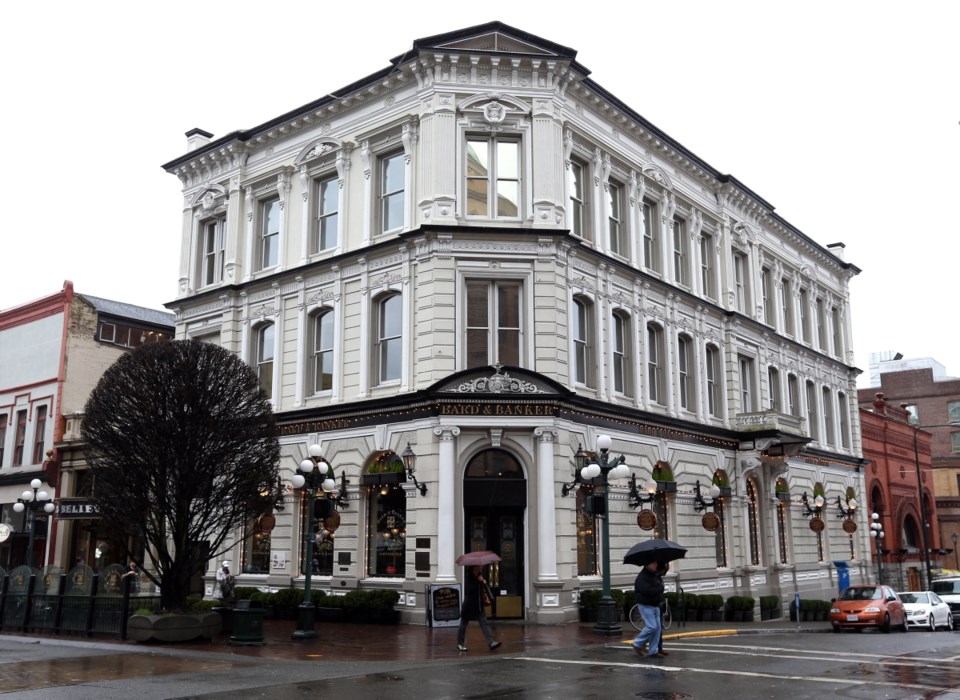A bid to unionize a popular Victoria restaurant has failed, raising questions as to why so few independent restaurants in Greater Victoria are unionized.
In a secret ballot vote held Thursday night, Bard and Banker Pub staff voted overwhelmingly against forming a union.
“The vote 55 to four speaks loudly for itself,” said owner Matt MacNeil, who declined to comment further.
Leading up to the vote, more than half of the staff signed cards expressing interest in a union, but by the time the vote took place, many had changed their minds.
“The rumour of whether the pub would keep its doors open or not if we voted yes had an impact on the decision, in my opinion,” said Eric Nordal, a part-time bartender who organized the union vote.
“The important thing is we had the opportunity as a staff to decide the future direction of the workplace, which in itself can be empowering. I hope that other workers in this industry see that they can also ask the same questions in their workplace.”
Nordal did not want to rehash the issues that led him to organize the vote.
Murray Gore, a national union representative with Unifor who scrutinized the vote for the union side, said the issue was not staff wages or poor management, rather a group of employees who wanted the protection of a collective agreement.
“Nobody at the middle of this union campaign had any ill words to say about their managers or employers,” Gore said.
“This is a group of workers who wanted to have a collective agreement and wanted to have a say on things like how schedules are developed.”
Frank Bourree, a tourism and hospitality analyst with Chemistry Consulting, said he was not surprised the union was turned down.
“Good employers don’t get unionized,” he said. “I know that Matt MacNeil and his pub companies are exemplary employers in this business.”
Bourree said the restaurant industry is all about relationships and staff can become like a family.
“It depends on the relationship between management and owners and the staff. The owners that develop trusting relationships with their staff, they don’t get unionized.”
Gore countered that if the workplace is about building relationships, a union makes it an equal one.
Several of the large hotels in Victoria are unionized, such as the Fairmont Empress and the Hotel Grand Pacific. Bourree said that’s because hotel staff tend to treat the job as a long-term profession, whereas serving is often a starting profession.
Many White Spot and KFC restaurants are unionized, but at independent restaurants it’s very rare.
Staff at the Cheesecake Factory, which operated for many years on Government Street, were successful in forming a union. The restaurant shut down several years ago.
Ian Tostenson, president of the B.C. Restaurant and Foodservices Association, said the high turnover rate among servers and bartenders is one of the reasons unions don’t proliferate.
“But we’re seeing more and more restaurants looking into basic extended health like dental and massage therapy,” Tostenson said. He said many small businesses struggle with offering benefits because the profit margins are already razor-thin and there’s the added complication of part-time employees.
In June, owner David Jones opened the Smoke ‘N Water restaurant in Parksville and introduced a no-tipping system while promising to pay his staff higher wages and offer benefits. Three months into the endeavour, Jones was forced to abandon the policy because customers didn’t like it.
Jones lowered staff wages but said he still intends to offset medical and dental costs for his 36 staff.
Gore said unionization is about offering more protection to restaurant employees.
“It’s a sector that needs more regulation. The government isn’t giving that and the workers need more help,” he said.
Liquor servers in B.C. make a lower minimum wage, $9 an hour, than the standard minimum wage of $10.25.
The lower wage is offset by tips.
Gore said when he talks to restaurant employees, many of them express interest in a union, citing long hours, no benefits and lack of job security as reasons.
“But when you talk to workers, one of the first parts of the conversation is ‘I'm scared of losing my job,’ ” Gore said.



